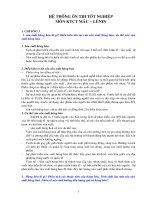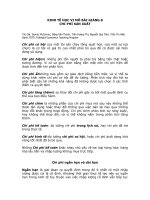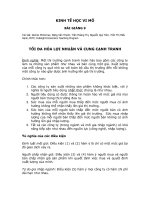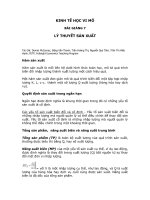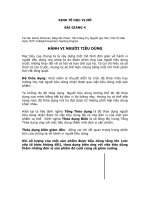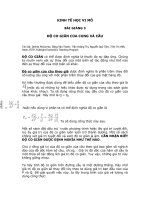Tài liệu kinh tế nước Anh British Economy Lecture 5 british economy for ss
Bạn đang xem bản rút gọn của tài liệu. Xem và tải ngay bản đầy đủ của tài liệu tại đây (1 MB, 4 trang )
BRITISH ECONOMY
BRITISH economy
A
Overview of economy
B
Working life
Revised by Mi Do, Thuy Pham & Hong Nguyen
1
2
BRITISH ECONOMY – OVERVIEW
BRITISH ECONOMY
Rank
1
2
3
4
5
6
7
8
9
10
Country
United States
China
Japan
Germany
France
United Kingdom
Brazil
Russia
Italy
India
GDP (million of USD)
16,800,000
9,240,270
4,901,530
3,634,823
2,734,949
2,521,381
2,245,673
2,096,777
2,071,307
1,876,797
Source: World Bank (2014)
World
#02
#03
United # 06
Kingdom
N.Y
London
3
GDP – composition by sector:
agriculture: 0.7%
industry: 20.5%
services: 78.8% (2013 est.)
Main industries today:
Banking and
finance
4
25% of Britain's land is arable;
almost half for meadows and
pastures.
Agriculture is highly mechanized
and extremely productive
Transport
equipment
Steel
Oil and gas
Inflation: 4.5% (2011) – 2.7%(2012)
Interest rate: 4.5%(2011)- 2.8% (2012)
Unemployment rate:
5.1%(2008) –7.8% (2012) –7.2% (2013)
AGRICULTURE
BRITISH ECONOMY – SECTORS
Europe
#01
Tourism
5
~ 2% of the labor force produces
60% percent of the country's food
needs
Sizable fishing industry
6
1
SERVICE
INDUSTRY
Dominated
service-related industries
Export
• Raw materials
• 40% food supplies
21stcentury
banking, insurance, business services
3.5 million
service-related jobs
90s
• Manufactured goods
Import
70s - 80s
3.5 million
manufacturing jobs
7
BRITISH ECONOMY
8
BRITISH ECONOMY - TRADE
The Great Conurbations
London
West Midlands
Greater Manchester
Merseyside (Liverpool,
Southport, Saint Helens)
Leeds, Bradford &
neighbouring districts
Tyneside-Wearside
South Wales
River Clyde Region
(Scotland)
Belfast Area (Northern
Ireland)
Exports & imports
• Exports
Manufactured
goods
Fuels
Food &
beverages
Chemicals
Tobacco
• Imports
Manufactured
goods
9
Machinery
Foodstuffs
One of the leading trading nations in the world
BRITISH ECONOMY - TRADE
BRITISH ECONOMY - TRADE
Exports
Trade Focus
Fuels
Exports: $801.7 billion (2012)
Largest export earner :
Chemical
Export Partners (2012)
Germany
11.3%
US
10.5%
Netherlands
8.8%
France
7.4%
Switzerland
7.1%
Ireland
6.2%
Belgium
5.1%
Imports
Imports: $777.6 billion (2012)
Import Partners (2012)
Germany
12.6%
China
8%
Netherlands
7.5%
US
6.7%
France
5.4%
Belgium
4.4%
Norway
4%
11
12
CIA Word Factbook (2013)
2
BRITISH ECONOMY
BRITISH ECONOMY
The Structure
Of Trade & Industry
Economic system: private + public
History:
1945-1980:
state controlled
1980s:
1979- 1990
A
Overview of economy
B
Working life
Conservative government gave more freedom to
businessmen
Privatize companies (share holders)
1994:
most had been privatized
13
14
BRITISH ECONOMY – WORKING LIFE
BRITISH ECONOMY
Shopping as a way of
spending money
Attitude to work
Lack of enthusiasm for work
+ Leisure = a sign of aristocracy
+ Non-manual job = sign of middle-class
+ Working day: starts late (8 a.m. for manual
jobs and 9 a.m. for non-manual ones)
Industrious
High earnings are more important than job
satisfaction
Now, weaker connection between
middle class and non-manual work
Not adventurous shoppers
(like reliability + brand-name
goods)
Late 20th cent.:
Supermarkets
moved out of town
streets (area in town where shops concentrate) still
survive
Shop opening hours: 9a.m. (On Sundays, large shops +
supermarkets: until 5p.m)
High
15
“Not only are we, in the words of Napoleon, 'a
nation of shopkeepers', we are also a country
of compulsive shoppers. We love to shop! It is
our number one leisure activity and accounts
for around 37% of all money spent in England.”
16
BRITISH ECONOMY – WORKING LIFE
Working in Britain
Usual working day: 9 a.m. – 5 p.m.
Usual working week: a five-day week
Averagely the longest of any country in
Europe
UK National Minimum Wage
Harrod’s, the most famous department
store in England that all visitors want to
visit. Here you can find anything, from
the cheapest to the most expensive
things
17
Year
21 and
over
18 to 20 Under 18
Apprentice*
2014 (current
rate)
£6.50
£5.13
£3.79
£2.73
2012
£6.19
£4.98
£3.68
£2.65
2010
£5.93
£4.92
£3.64
£2.50
18
3
BRITISH ECONOMY – WORKING LIFE
BRITISH ECONOMY – WORKING LIFE
UK employment law
Transport
Holidays
one of the
most
expensive
5 hrs/ Sat.
5hrs/weekday
Max. 25hrs/
week
Schooldays
places to live
in
Accommodation
Legal working age: 13
Under-15s:
2hrs/ Sun.
2hrs/ schoolday
Over-15s:
8hrs/ Sat.
LONDON LIVING WAGE
8hrs/ weekday
Max. 35hrs/
week
£8.80/hr
19
BRITISH ECONOMY – WORKING LIFE
Jobs for Teenagers
Kinds of jobs:
•
•
•
•
Delivering newspaper
Babysitting
Helping the milkman on his round
Other jobs: Working in a shop, working in a
hairdresser’s, office work, washing cars, working
in a café or restaurant, domestic work in hotels
Work permit required
Wage: up to £3.00/ hr
Workers under 16: not entitled to National
Minimum Wage
20
1. British people can start work at the age of 16.
2. On average, men in Britain work 40 hours a week.
3. Women usually retire when they are 60.
4. Today more and more people work in offices and with
computers.
5. London is the most important financial center in the world.
6. Retailing is an important industry today.
7. Most of the top ten retailers in
Europe are British.
8. Hi-tech industries are important
today.
9. Most British people get 30 days
holiday a year.
10. There are ten public holidays
a year in Britain.
21
22
Economy - review
Terms to explain:
GDP, Pound Sterling, privatization, National minimum wage, work
permit, paid holiday, brand-name product, high streets
Questions
1. What are the indicators to show that Britain has a strong economy?
2. What challenges is the UK economy facing? (search the Internet for
more information)
Economic Structure
3. What are the main economic sectors and their contribution to
Britain’s GDP?
4. Why is Britain’s agriculture said to be extremely productive? What
are the reasons for this productivity?
5. Why is the service sector said to have dominated UK’ economy?
6. How has the shift from manufacturing to service affected regional
economies in the UK?
Economy - review
Trade in the UK
7. What are the main imports and exports of Britain? Which
one is the largest export earner?
8. Which countries are the main trading partners of Britain?
9. How has Great Britain’s trade focus changed recently?
Structure of Trade and Industry
10. What changes happened in the structure of trade and
industry in the UK during the last half of the 20th century?
Working life
11. What are the attitudes of British people to work?
12. How do British people shop?
13. Find in the section of Working in Britain about the
following issues:
23
Typical working day
Wage
Employment law toward children
Kind of jobs teenagers can do
24
4
